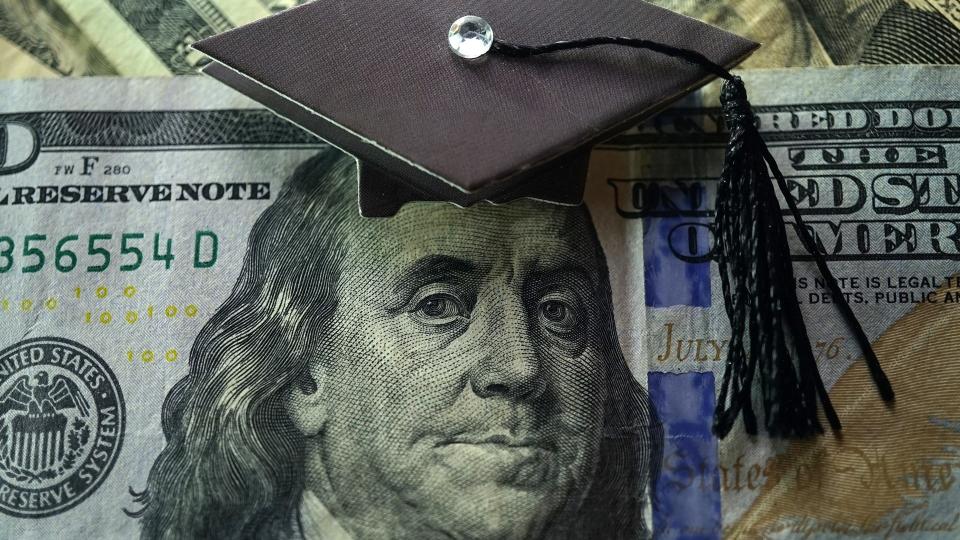Student Loan Forgiveness: Experts Weigh In on How To Prepare For Repayments This January

The pause on federal student loan payments, last set to expire on Aug. 31, was extended through Dec. 31 by the Biden administration. Borrowers have until the end of the year to resume repaying student debt and experts are advising getting a head start now on plans to pay off debt.
The Future of Finances: Gen Z & How They Relate to Money
Looking To Diversify in a Bear Market? Consider These 6 Alternative Investments
Keep Paying Your Loans During the Pause
Charlie Javice, head of student solutions, Chase and founder of Frank, recommends that borrowers who can afford to should keep paying their loans during the pause.
“By continuing to pay down student loans through the pause, you’ll be able to take advantage of the 0% interest rate to pay down the principal debt, saving more money in the long run on interest fees,” Javice said.
Live Richer Podcast: How To Get Rid of Your Student Loan Debt
Add To Your Emergency Fund
Use this time to build up your savings or emergency fund as a buffer. Set up an auto-draft for your savings each month so it’s not even an option for you to spend that money.
“An emergency fund will help you to make financially sound decisions when the worst happens. You’re less likely to turn to debt when your AC goes out if you have cash in the bank,” said Bobbi Rebell, CFP and personal finance expert at Tally.
Pay Down Any Other Types of Debt
Borrowers are advised to use this time to pay down any other types of debt. Rebell recommends starting with debt that has the highest interest rates. For most people, this is likely credit card debt.
Tackle any outstanding debt before student loan payments kick in. If you are unable to pay the remaining debt in full, keep paying down the debt. This will better position you to put money back in your pocket and toward your financial goals.
Conduct a Repayment Dry Run
Michael Sullivan, personal financial consultant at Take Charge America, said borrowers should put aside the amount that will be due right now to make sure they can do it.
Ideally, Sullivan said borrowers will have been putting the payment amounts aside each month or using the money to pay down other debt to avoid a budget crunch. If the borrowers have spent it all, it is time for a (very) unpleasant budget rebalance. This acts as a dry run of what to expect and be prepared for once they resume making payments.
Borrowers able to put aside money may transfer the amount to savings or to a special account. Those who can’t put aside the entire amount should determine exactly the amount they are short on so they can make adjustments in earnings or spending.
“Not only will this dry run determine if they are ready, it will also create a fund to make it easier to get back into payment mode,” Sullivan said.
Conduct an Income Audit
If the repayment dry run doesn’t work, Sullivan recommends borrowers begin considering other strategies for tackling student debt. A student loan counselor may be able to suggest a strategy, like refinancing, or another debt management arrangement that best suits your financial situation.
One possible move borrowers may make is increasing their income. Rebell recommends borrowers use this time to conduct an income audit. This audit allows you to take a step back and think about your income and how you can potentially increase it. A few examples include considering asking for a raise, searching for other, higher paying career opportunities if you have been in your current role for a while or working a side hustle.
“Think about your financial goals as you do this income audit and ask yourself if your current income matches the trajectory that you’re hoping for financially,” Rebell said. “If not, don’t be afraid to explore other options.”
Enroll In Autopay
“If you were enrolled in autopay prior to the payment pause, you must reaffirm you would like to re-enter into autopay,” Javice said.
Borrowers not already enrolled in autopay may use this time to enroll themselves. This ensures they don’t forget to submit payments on time once the pause ends.
Why Planning Ahead Matters
It may not feel like the most fun way to spend the holiday season preparing to resume student loan payments, but planning is always the key to success. And budgeting is just financial planning.
“Those who anticipate expenses and prepare for them are more likely to be successful and less likely to experience a financial crisis,” Sullivan said.
Making gradual adjustments, like a practice repayment dry run and being able to pay off any other forms of debt when there’s a window of opportunity to do so, may also be less painful than the shock of a sudden budget adjustment.
More From GOBankingRates
5 Best Southern Cities To Retire on a Budget of $1,500 a Month
Check Out Readers' Favorite Small Businesses in Our 2022 Small Business Spotlight
This Credit Score Mistake Could Be Costing Millions Of Americans
4 Ways Women Can Prepare Their Finances for Unexpected Life-Changing Events
This article originally appeared on GOBankingRates.com: Student Loan Forgiveness: Experts Weigh In on How To Prepare For Repayments This January
